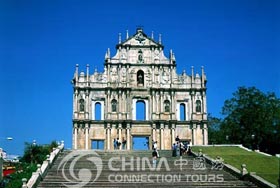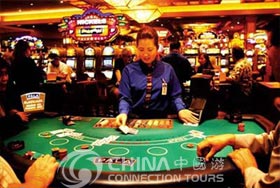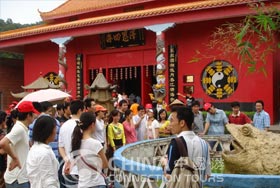
 This former Portuguese enclave retains the European charm and style that contributes to a lifestyle dubbed Mediter-Asian. All too often, the tiny territory on the southwestern tip of the Pearl River estuary is treated as a tourist side trip and economic postscript to Hong Kong, but Macau is very much its own place. A uniquely multicultural enclave, it played a pivotal role as China's oldest western settlement and it was the last to return to China sovereignty. Macau became a Special Administrative Region (SAR) of the People's Republic of China on 20 December 1999 when the Portuguese flag was lowered in Macau, marking the end of an era.
This former Portuguese enclave retains the European charm and style that contributes to a lifestyle dubbed Mediter-Asian. All too often, the tiny territory on the southwestern tip of the Pearl River estuary is treated as a tourist side trip and economic postscript to Hong Kong, but Macau is very much its own place. A uniquely multicultural enclave, it played a pivotal role as China's oldest western settlement and it was the last to return to China sovereignty. Macau became a Special Administrative Region (SAR) of the People's Republic of China on 20 December 1999 when the Portuguese flag was lowered in Macau, marking the end of an era.
Macau Special Administrative Region (SAR) is located on the southeastern coast of China. The territory includes a peninsula and two islands in the Pearl River Delta of Guangdong Province. The total area of Macau is 25.8 sq km, the peninsula has 8.5 sq km, Taipa 6.2 sq km, Coloane 7.6 sq km and the reclaimed land between Taipa and Coloane has 3.5 sq km of land. The city of Macau is built on the peninsula; two bridges of 2.5 km and 4.5 km respectively link it to its nearest island of Taipa, which in turn is joined to Coloane by a 2.2 km-long causeway. At the extreme northern end of the peninsula, on a narrow isthmus, is the imposing gateway (Portas do Cerco, or Border Gate), which leads to the Zhuhai and Zhongshan areas of China. Macau is 60km from Hong Kong and 145km from the city of Guanzhou.
Local time is eight hours ahead of Greenwich Mean Time. Macao's climate is warm and humid with a fairly wide variation in temperature over the year. From June to September, the temperature can rise to over 30 C. while it can drop to below 10 C from November to February. The average temperature rarely drops below 14 C. Macao's weather is also influenced by tropical cyclones from the South Pacific Ocean during the typhoon season. The climate is moderate to hot, with an average annual temperature of just over 20 C (68F) and a yearly mean variation between 16 C (50F) and 25 C (77F). The humidity is high with an average range between 75% and 90%. Rainfall is also high with the yearly total between 40 and 80 inches. The best season is autumn (October-December) when days are sunny and warm and the humidity low. The winter (January-March) is cold but sunny. In April, the humidity starts to build up and from May to September the climate is hot and humid with rain and occasional tropical storms (typhoons).
 As of 31 December 2000, Macao's local population numbered 438,000 inhabitants. Population density is over 18,000/km, and the northern part of the peninsula of Macao is regarded as one of the most densely populated areas in the world. Macao has undergone rapid demographic growth over the last two decades, increasing at an annual rate of around 4%. Over 96% of Macao's population speaks Chinese and Portuguese. Cantonese is the dialect most commonly used in everyday dealings but Mandarin is also widely spoken. Fujianese is another Chinese dialect that is commonly heard in Macao.
As of 31 December 2000, Macao's local population numbered 438,000 inhabitants. Population density is over 18,000/km, and the northern part of the peninsula of Macao is regarded as one of the most densely populated areas in the world. Macao has undergone rapid demographic growth over the last two decades, increasing at an annual rate of around 4%. Over 96% of Macao's population speaks Chinese and Portuguese. Cantonese is the dialect most commonly used in everyday dealings but Mandarin is also widely spoken. Fujianese is another Chinese dialect that is commonly heard in Macao.
The local currency that is known as Pataca is divided into 100 avos and it is Macau's official currency together with Chinese Yuan. Roughly 8 Patacas is equivalent to 1 US dollar. Foreign currency or travelers' checks can be easily changed in hotels, banks and at authorized exchange dealers located around the city. If the visitor needs to change money outside the usual working hours, there are 24-hour exchange counters operating in the Macau International Airport (Taipa Island) and in the Lisboa Hotel (Macau). Banks open normally from 9 a.m. to 5 p.m. Most credit cards are accepted in hotels, shops and restaurants. There are no restrictions on the amount of currency that can be brought in or taken out.
The name 'Macau' is derived from the name of a Chinese goddess, popular with seafarers and fishermen, known as A-Ma or Ling Ma. According to legend, a junk sailing across the South China Sea one clear day found itself in a sudden storm. Everybody on board was about to give up all hope of surviving this natural calamity, when an attractive young woman, who had boarded the ship at the very last minute, stood up and ordered the elements to calm down. Miraculously, the gale winds stopped blowing and the sea became calm.  Without further incident, the junk arrived safely at the port of Hoi Keang. The young woman stepped ashore and walked to the crest of the nearby Barra Hill where, in a glowing halo of light and perfume, she ascended into heaven. On the particular spot where she set foot on land, a temple was built in homage to her. In the 16th century, when Portuguese sailors landed and asked the name of the place, the natives replied A-Ma-Gao (Bay of A-Ma). So the peninsula was renamed. In modern usage, Amagao was shortened to Macau.
Without further incident, the junk arrived safely at the port of Hoi Keang. The young woman stepped ashore and walked to the crest of the nearby Barra Hill where, in a glowing halo of light and perfume, she ascended into heaven. On the particular spot where she set foot on land, a temple was built in homage to her. In the 16th century, when Portuguese sailors landed and asked the name of the place, the natives replied A-Ma-Gao (Bay of A-Ma). So the peninsula was renamed. In modern usage, Amagao was shortened to Macau.
Macau has always had an atmosphere that made it different from the surrounding areas. Today it is still this mixture of the Chinese and Portuguese cultures harmoniously maintained and developed by its people that make this place a specific cultural entity. Macau possesses the highest population density rate in the world but the per capita income is one of the highest in Asia. There is a cosmopolitan atmosphere, here where Asia meets Europe and where the Mediterranean culture lives side by side with the Chinese one.

